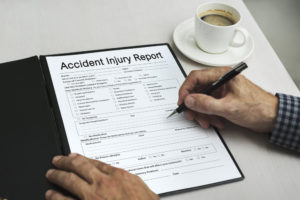Going on a cruise is an exciting adventure, whether it’s your first trip or your fifteenth! That excitement can turn to confusion if you’re injured on a cruise ship. Most people never plan for what to do if they end up with an injury while on a cruise ship. What happens when you get injured or ill on the high seas, far away from any hospital or urgent care center? There are protocols for dealing with mild to serious injuries onboard. But it’s up to you to know how to document the details of your accident in case it turns into a legal battle. The best time to learn what to do is before you ever board the ship!
1. Report Your Accident and Injury
Cruise ships operate under the rules of the International Maritime Organization. Each cruise line is required to develop safety management systems. These systems, in turn, must include an accident investigation and reporting section. In other words, they are required to have an accepted procedure to follow when a passenger is injured. Report your accident and make sure it is documented. Most likely, if you’ve been injured, you will go to the medical office. There, you will fill out an accident report and the investigation will automatically be triggered. If you don’t go to the medical office, be sure to visit the Purser’s desk.
2. Understand Your Rights if You Signed an “Assumption of Risk Form”
Cruise lines have come up with all kinds of activities that make their cruises more entertaining and adventurous. Zip lines, waterslides, rock wall climbing, and ice skating are just a few. Another activity that is popular is the FlowRider. This activity simulates the action of the ocean’s waves so you can surf onboard. Swimming pools and diving boards are also common activities on cruise ships.
Like most adventures, these activities can lead to injuries. The cruise lines often ask passengers to sign an Assumption of Risk form, which may release them from liability in case of an injury. If you’ve signed a release form, and you are injured, only an experienced maritime attorney can determine the impact it could have on your injury claim.
Of course, you don’t have to be adventuress to get injured. A lot of causes of injury or illness can happen whether you are zip lining or reclining by the pool. For example:
- Slip and Fall
- Elevator Accidents
- Broken Railings
- Elevator/Escalator Accidents
- Being Struck by Unsecured Objects
- Ship Fires
3. Have Your Injuries Treated
Cruise ships have one doctor and some nurses on-board. There are also limited pharmaceuticals to treat minor, nonemergency conditions. Pharmacies can also provide prescription medication that gets left behind. Major cruise ships have medical centers that provide inpatient care for patients who get seriously ill and need to stay one or more nights. It’s rare for patients to require evacuation from cruise ships, but it is an option when needed.
Although injuries range from mild to severe, you should always have your injuries treated. Getting treatment helps prevent complications like infection. It also ensures the accident and injury are documented by the medical staff. Once they do, ask for a copy of the document to keep for your records.
4. Be Mindful Of What You Say
It isn’t just the cruise line that contributes to the accident report. Employees on the ship will investigate the accident, starting with the medical staff. Making statements like, “Oh, it was my own fault for being careless” or “It’s nothing serious, I’m sure it will be fine” can come back to haunt you. Even though it might not seem serious at the time, your injury could be worse than you think. Always be honest, but be aware of what you’re saying.
Any kind of injury has the potential to develop an infection. Illnesses including viruses have the potential to get worse before they get better. Even though you may be in pain and not feeling well at the time, try to include all the details of the accident and your injury accurately.
Hopefully, you’ll be as good as new by the time you leave the cruise. If not, you’ll have a detailed statement that supports any future claims.
5. Think Before You Write
Cruise lines often have passengers who are injured on a cruise ship make a written statement. They may request a statement in your handwriting to keep on record.
If you are in pain or don’t feel well, refuse to make the statement. Don’t allow a traveling companion to make a statement for you either; even if they witnessed your accident. (Your travel companion can write their own statement as a witness, but he/she should not write your statement). If the cruise line is insistent and you make a written statement, keep it brief. Include a description of how you feel and that you believe the cruise ship is responsible for your injury. You don’t want it to appear as though you changed your story later on.
6. Pay Attention to the Investigation
The investigation that the cruise line employees conduct after your accident isn’t just for your protection; it’s for theirs. They always assume that you might sue them for compensation to pay for your injury. They will try to collect as much information as possible to use in their defense. Having this fact in mind will help you structure your comments carefully. You aren’t trying to deceive them about your intentions. You just need to prevent them from misrepresenting the part the cruise line played in your injury.
7. Do Your Own Investigation
A cruise ship carries thousands of passengers. Many areas stay heavily populated at any given time. If your accident happened in your cabin, you may be on your own. But if it happened in an area where there are other passengers, someone probably saw what happened. Collect the names and contact info of any who are willing to help.
Although crew members might be less hesitant to help, gather their information, too. Get their job position as well. If your accident wasn’t the first of its kind, they’ll know about existing issues. A statement from them could be vital if you end up pursuing a personal injury case.
Use your cell phone or camera to take photos of your injuries and the location of the accident. If you don’t have either with you, check the ship’s shops to find a disposable one or a cheap digital camera. It’s worth the investment to collect evidence that is visible. Gather as much information as possible during the remainder of the cruise. Once you leave the ship, it’s too late. Any evidence to support your case will sail away with it!
8. Stay Off Social Media
People often use social media to share pictures of their vacations with friends and family. Avoid the temptation to announce that you’ve been injured on a cruise ship or to post pictures of you having a great time after an injury. Although sharing your comments and photos is different on a ship, it is possible. Many offer wi-fi so you can use your mobile devices.
The problem is that insurance companies know how common it is to share details on social media. After all, that’s what social sharing is all about! If you minimize your injuries to put your parents’ minds at ease, the other side could hold it against you. If you take credit for the accident to boast to your friends, it could shift the blame in your direction. Don’t put information on social media thinking that it’s safe. Insurance companies often know how to find what they’re looking for. Often, it’s the first place the insurance company and the attorney for the other side will look.
9. Don’t Wait to Report Accidents, Incidents, or Assaults
If you are criminally or sexually assaulted, in an accident, or otherwise injured on a cruise ship, report it immediately. Crimes of all kinds occur in all kinds of places. Take the incident seriously, even if the cruise ship doesn’t. Insist that they follow the standard procedures the company has in place. It’s to your advantage to have the incident reported, documented, and investigated.
Don’t leave it up to the cruise lines to report your injury to US authorities. If the injury occurs while in port, report the incident to the local authorities. Reach out to local police departments and the FBI. Make as many attempts as needed to find the right authority to investigate your case. Failing to report your accident to authorities could result in jurisdictional issues that allow the person who hurt you to get away with it.
Sexual assaults are especially difficult to deal with. If you were unknowingly given drugs, you might not even know for certain everything that happened. One of the biggest reasons women or men don’t come forward to report sexual assault is shame. As difficult as it may be, it’s even more important to follow these previous steps if you were the victim of a sexual assault on a cruise ship. Every detail of the attack needs to be documented.
If another passenger is guilty of the crime, it often involves extensive investigation to determine if the cruise line is liable. The first steps are to get medical treatment, report the crime, collect evidence, and contact authorities. Next, contact a maritime personal injury attorney to learn more about your rights. Don’t remain a silent victim. Make the person who is responsible for your injuries pay for their crime.
10. Talk with a Maritime Personal Injury Attorney
Regardless of the cause of your injury, talk with a maritime lawyer who understands maritime law such as Charles D. Naylor. The same laws that apply on land might be different when you are injured on a cruise ship. Schedule a consultation and take all of the evidence you have collected. This includes bills for medical treatment for your injury.
Maritime law is a very complex area of law. Never assume that you do or don’t have a case based on your personal analysis. A case evaluation doesn’t cost you anything. If someone else is responsible for your injuries on a cruise ship, they have the responsibility to pay you compensation. Get the experienced representation that will get you results.
Most people who go on a cruise have a great time without incident. It’s a great way to spend your vacation and enjoy a lot of activities in a confined area. Most people think the only risk is developing a virus or being swept overboard! The fact is, crimes and accidents occur on cruise ships just like they do anywhere else.
It is always in your best interest to act quickly. Cruise lines set the amount of time that passengers have to file a claim. Often, you will find this time period in fine print on the passenger’s ticket, known as the Passage Contract. Typically you’ll find that the cruise lines require you to provide written notice of the claim within 6 six months of the date of injury and a claim needs to be filed within a year of the date of the injury. The courts typically enforce the limitations.
If you experience any type of injury or illness on a cruise ship, contact Naylor Law. Our law firm has more than 40 years of experience representing cruise ship passengers. We have in-depth knowledge of maritime law and have used our expertise to get millions of dollars in settlements for our clients. Schedule a complimentary case evaluation today. There’s no charge to you unless we win your case!














